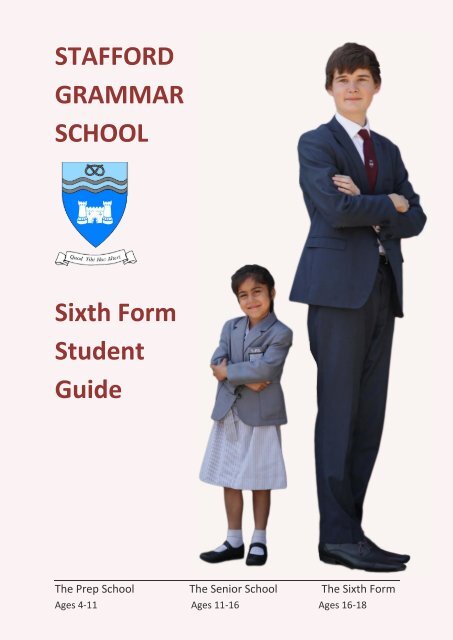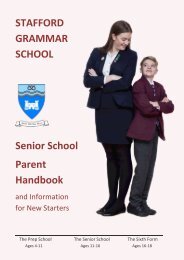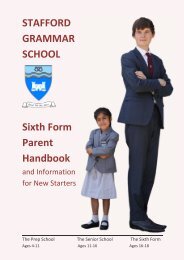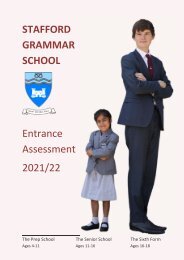SIXTH FORM STUDENT GUIDE 2018
Create successful ePaper yourself
Turn your PDF publications into a flip-book with our unique Google optimized e-Paper software.
STAFFORD<br />
GRAMMAR<br />
SCHOOL<br />
Sixth Form<br />
Student<br />
Guide<br />
The Prep School The Senior School The Sixth Form<br />
Ages 4-11 Ages 11-16 Ages 16-18
Sixth Form Student Guide<br />
CONTENTS:<br />
Introduction ......................................................................... 3<br />
Keeping Up-to-Date.............................................................. 3<br />
Mission Statement ............................................................... 4<br />
Common Rooms ................................................................... 5<br />
Signing in and out ................................................................. 5<br />
Study Periods ....................................................................... 6<br />
Homework ............................................................................ 6<br />
Uniform and Appearance ..................................................... 7<br />
Behaviour ............................................................................. 8<br />
Sixth Form Games ................................................................ 9<br />
Help ...................................................................................... 9<br />
Cars ..................................................................................... 10<br />
Part-time employment ....................................................... 10<br />
Careers Advice .................................................................... 10<br />
Curriculum .......................................................................... 11<br />
Outline of the Lower Sixth ................................................. 12<br />
Outline of the Upper Sixth ................................................. 13<br />
Personal, Social, Health and Economic Education ............. 14<br />
Opportunities ..................................................................... 16<br />
Reports and Grades ............................................................ 25<br />
UCAS ................................................................................... 26<br />
Apprenticeships .................................................................. 27<br />
2
Sixth Form Student Guide<br />
Introduction<br />
Now that you are part of the Sixth Form, things change. This guide has been designed to<br />
help you adjust to these changes and to enable you to understand what the Sixth Form<br />
involves.<br />
What is the purpose of the Sixth Form?<br />
Quite simply, it is to give you the chance to make choices in your life.<br />
Reaching your potential in your academic studies will give you greater flexibility in your<br />
choice of higher education or employment. You will have far more control over your<br />
learning but don’t be daunted as you can ask for help at any time. In the small classes you<br />
will be treated differently. Your sixth form tutor team and your teachers are keen to<br />
encourage and support you.<br />
Taking on responsibilities is part of a broader education which we believe is vital for all our<br />
students. As mature young people, you will be expected to support the staff in the daily<br />
running of the school and in a variety of areas where you have expertise or wish to develop<br />
it.<br />
Privileges go hand in hand with responsibilities. You are the only year group who can sign<br />
out and leave the School premises at lunch time. You have your own Common Rooms and<br />
the responsibility to keep them clean, tidy and in perfect condition. You have study time<br />
and towards the end of your Sixth Form you may be able to study at home.<br />
Be careful not to take on too much: balance your commitments.<br />
Our aim is to give you as many opportunities as possible to develop your academic and<br />
personal potential: it is up to you to make the most of these opportunities so that you can<br />
look back on your Sixth Form experience with satisfaction and look forward to a successful<br />
degree or apprenticeship.<br />
Keeping Up-to-Date<br />
You can follow @StaffordGrammar on Twitter and Facebook to receive regular updates and<br />
see what pupils are doing throughout the week.<br />
https://www.facebook.com/StaffordGrammar/<br />
3
Sixth Form Student Guide<br />
Mission Statement<br />
We exist to provide a grammar school community of happy, confident and caring individuals<br />
who achieve their full potential.<br />
We provide:<br />
<br />
<br />
<br />
Small classes<br />
A disciplined, well-ordered environment<br />
A range of options at GCSE, AS and A-level<br />
We have:<br />
<br />
<br />
<br />
A warm and friendly atmosphere<br />
Time for every child<br />
Dedicated staff<br />
We will:<br />
<br />
<br />
<br />
Recognise individual success<br />
Develop self-confidence through involvement<br />
Keep parents informed of their child’s progress<br />
By these means we will continue to achieve academic and personal success.<br />
4
Sixth Form Student Guide<br />
Common Rooms<br />
When entering the Sixth Form here at Stafford Grammar, you will find yourself blessed<br />
with your very own Common Rooms. You have a purpose built suite of rooms in the new<br />
building. The large Common Room has a large kitchen, with a tiled floor area, for drinking<br />
and eating. You will also be able to relax and work in this room. There are also two work<br />
rooms – one for quiet discussion, the Amber Room, and one for silent study, the Red<br />
Room. University information is in the Amber Room and the Red Room includes your<br />
tutors’ office.<br />
You have a responsibility to treat your Common Rooms with respect. If any accidents<br />
happen, you must report them to a tutor immediately. If there is any damage, you must<br />
take responsibility. As young adults preparing to go to university or the world of work, you<br />
must keep your Common Rooms clean and tidy. The Common Room Committee, which is<br />
separate from the prefect team, organises and runs the Sixth Form Centre.<br />
Above all, this is your very own haven from the rest of the school – it’s up to you to retain<br />
this privilege.<br />
Signing in and out<br />
As a Sixth Former, you have the privilege to roam more freely, but the School still needs to<br />
know where you are. Registering takes place at 8.50am, and it is vital that you are both<br />
punctual and quiet, or else face the wrath of your Sixth Form tutors! During lunchtimes you<br />
may leave the school grounds, but you must sign yourself out and in again – don’t rely on<br />
one person to sign out a large group of you. The book can be found in the School Office and<br />
outside the Head of Sixth Form’s Office. If you are late for registration, you MUST sign in<br />
too.<br />
If you are away for any reason, help yourself to an Absence Form (to be found outside the<br />
Head of Sixth Form’s Office), tick the relevant box, get it signed by a parent and return it to<br />
your tutor as soon as possible.<br />
As you begin to investigate to which universities or apprenticeships you may want to apply,<br />
most institutions will offer ‘open days’ for you to look round – you are permitted to attend<br />
a maximum of three days during term-time, and do try to look at as many as possible either<br />
at weekends or during holidays.<br />
Many of you will be learning to drive in the Lower Sixth, but this is no excuse to be absent<br />
yourself from school! Driving tests may be unavoidable (just remember to sign yourself<br />
out), but lessons should not be organised during the school day.<br />
5
Sixth Form Student Guide<br />
Study Periods<br />
In scrutinising your Sixth Form timetable, one of the first things you may notice (and<br />
certainly one thing you will be looking forward to) are your ‘study periods’, lessons where<br />
you are given the freedom to study as you see fit. However, before you begin making<br />
hedonistic plans of an hour and ten minutes of pure unadulterated laziness, your work is<br />
constantly monitored by your teachers and good grades come from well-motivated<br />
students. Use this study time wisely. The encouragement afforded by the Red and Amber<br />
Rooms to catch up (or even get ahead!) with your work-load is, believe it or not, a blessing<br />
in disguise – the freedom allocated to Sixth-Formers puts time-management in your own<br />
hands, which in turn requires a considerable amount of self-discipline. You may even find<br />
you choose to go to the Red Room or the Library in later months!<br />
Homework<br />
All students are set homework.<br />
In the Sixth Form students can expect to undertake a minimum of five hours per subject<br />
per week of independent study.<br />
A Sixth Form Planner is provided for each student and we advise that all homework should<br />
be recorded in this.<br />
6
Sixth Form Student Guide<br />
Uniform and Appearance<br />
Out of the burgundy and into the blue! With the new attire comes a considerable amount of<br />
respect and admiration from the younger pupils, itching to get into your shoes!<br />
Boys: For all you lads, uniform comprises a plain navy blue suit, white shirt, burgundy school<br />
tie and black shoes. Earrings and other facial piercings are not permitted, and hair should be<br />
kept reasonably short – we also expect any facial topiary to be well and truly pruned, so get<br />
that razor going!<br />
Girls: For the girls, a plain navy blue suit, white blouse and black shoes are all you need. The<br />
heel of your shoes can even (gasp!) be higher than the previously regulatory two inches, but<br />
do remember that you will have to teeter around the not-very-stiletto-friendly school<br />
grounds and stilettos are not allowed in the Science labs – be sensible, think of all those<br />
stairs and your poor ankles. Also, as something to bear in mind when choosing your suit, try<br />
and find a skirt that’s not “too long or too short” – this may seem like a daunting task, but<br />
between five centimetres above or below the knee is a good guideline. A plain navy-blue<br />
tailored suit with either a skirt or straight leg full length trousers. You are also allowed to<br />
wear make-up and jewellery ‘in moderation’ – just aim to look your smart and professional.<br />
A full and up-to-date list of school uniform and PE kit is available from the Parents’ page<br />
of the school website.<br />
7
Sixth Form Student Guide<br />
PE Notes<br />
<br />
<br />
<br />
Earrings and watches must be removed<br />
Notes must be provided if pupils are to be excused from lessons. Serious medical<br />
conditions or injuries are the only acceptable reasons for non-participation<br />
PE staff must be notified if there is any medical condition which could affect a pupil’s<br />
participation<br />
A locker is available for each student in the sixth form centre. Bags should be stored in bag<br />
racks when possible. They may be left neatly in registration rooms. Bags left unnecessarily<br />
around school will be confiscated and the owners punished. Wherever possible, personal<br />
belongings should be stored in lockers.<br />
Behaviour<br />
As the oldest pupils in Stafford Grammar, you set the example for the rest of the school, so<br />
make sure you both appear and behave accordingly, both on and off school grounds. You<br />
are a walking talking advertisement for SGS; thus any foul language will not be tolerated,<br />
and smoking or drinking alcohol during the lunch hour could lead to immediate suspension<br />
or worse. You have been warned!<br />
In dealing with the younger pupils, be firm with the unruly ones if needs must, but always be<br />
fair, and look out for who may need your help, support, or just a friendly word. Your<br />
responsibilities may also stretch to showing visitors and prospective pupils around Stafford<br />
Grammar – but if you see anyone at all from outside the school, make sure you welcome<br />
and guide them to where they need to be. This may sound like the usual lectures dished out<br />
by your elders, but these are maximum Brownie-point scoring opportunities, and if you act<br />
with trustworthiness and maturity, staff will treat you with respect.<br />
8
Sixth Form Student Guide<br />
Sixth Form Games<br />
PE lessons are compulsory for all Sixth Form students and take place from 2.35pm to<br />
3.50pm on Wednesday afternoons. Different options are available in each term:<br />
Fixtures against various schools take place mainly on Wednesdays with occasional Saturday<br />
fixtures. If selected, you are expected to play. Colours and Half Colours are awarded to<br />
students who show commitment to training and matches, above average performance and<br />
representational honours.<br />
You will be required to wear correct school kit, remove jewellery and arrive promptly for<br />
lessons. If you are unable to take part for any reason, you must provide a letter in advance<br />
for the Head of Sixth Form. There is an opportunity for you to assist with coaching younger<br />
pupils and teams at lunchtime and after school practices. In some areas this could lead you<br />
to coaching or umpiring qualifications.<br />
Help<br />
Never be afraid to ask for help. Whether your concern is a problem with your A level<br />
subject or not enough time to do all the things you have promised to do, share your worries<br />
as they will not go away unless you act. Speak to your tutors or your subject teachers. You<br />
can always speak to one of our School Nurses too.<br />
9
Sixth Form Student Guide<br />
Cars<br />
Driving to school in your car: your parents sign a letter detailing your registration and<br />
showing they give permission for you to use your car to and from school and at lunch times.<br />
There is a speed limit of 10 mph on site and you are expected to drive very carefully as<br />
pupils can easily run out of buildings without looking. If you do not drive responsibly the<br />
School can withdraw its permission for you to park on site.<br />
Driving is the single, most significant thing you do.<br />
Be sensible: don’t take more passengers than there are seat belts.<br />
Be sensible: don’t show off by driving fast or dangerously.<br />
Be sensible: don’t ask for a lift when there isn’t room.<br />
Part-time employment<br />
Experiences out of School are valuable in developing skills as well as increasing your<br />
finances. There must however, be a word of caution: the prime purpose of these two years<br />
is to gain the best possible A level grades. Some students do take on more than they can<br />
reasonably cope with.<br />
Don’t let your paid work interfere with your academic work.<br />
Careers Advice<br />
You will have access to careers advice and Mrs Hollinshead organises any interviews with<br />
careers services and the Armed Forces. They all take place in school.<br />
10
Sixth Form Student Guide<br />
Curriculum<br />
In the Sixth Form most students study four AS levels in the Lower Sixth and most Upper<br />
Sixth students continue three courses to the full A-level.<br />
A full list of available A-level courses available in the Sixth Form can be found in the sixth<br />
form prospectus.<br />
In the Upper Sixth some students opt to do an Extended Project Qualification (EPQ), which is<br />
an extended project on a topic area of your choice. You will be allocated a Project<br />
Supervisor, however, it is down to you to manage and plan your project. It is the<br />
independent nature of this qualification which can be so appealing to universities and future<br />
employers.<br />
Each week all Sixth Form students will attend a tutor period which provides a variety of<br />
opportunities including; study skills, gap year advice, target setting and review, pantomime<br />
rehearsals, university advice, UCAS application support, apprenticeship application support,<br />
interview preparation, driving safety, health and first aid at university, getting work<br />
experience, e-safety, relationship advice, alcohol and drug abuse, student finance, student<br />
debt, interview and assessment centre preparation, teamwork activities, leadership tasks,<br />
food for university, careers advice. We also arrange many guest speakers from industry,<br />
university and support organisations.<br />
Sixth Form games are compulsory for all sixth form students and take place on Wednesday<br />
afternoons. Different options are available each term and include: football, netball, rugby,<br />
hockey, badminton, basketball, tennis, zumba, fitness gym, running.<br />
11
Sixth Form Student Guide<br />
Outline of the Lower Sixth<br />
Finding a balance<br />
The trick at the beginning of the Lower Sixth is to organise your time effectively so you can<br />
keep up with the demands of your A level courses, cope with your new responsibilities and<br />
involve yourself in extra-curricular activities. It is not an easy balance to achieve and you<br />
should seek guidance from your teachers, tutor, Head of House or Head of Sixth Form if you<br />
are struggling.<br />
Pantomime<br />
During the latter half of the first term, it is your chance to be involved in the Sixth Form<br />
panto. Participation is expected, whether as script writer, director, performer, costume<br />
maker or curtain mechanic! The whole thing is loads of fun!<br />
Other events<br />
Around Easter time, prefects are elected. Other prefects will be added to the first group<br />
during the year and these are chosen by the staff. Shortly after Easter, the Head of School<br />
and deputies are elected by staff.<br />
Mock examinations take place in January and external examinations for AS levels may<br />
happen in May and June. Find out your own schedule! It is important to work hard<br />
throughout the year because you will not get the grades you are looking for if you leave<br />
revision to the last minute.<br />
12
Sixth Form Student Guide<br />
Outline of the Upper Sixth<br />
The journey through UCAS and Apprenticeship applications<br />
During your summer holidays you may have sorted out what you want to study or where<br />
you want to work. If not, then the first term will be a busy one. Decisions about your future<br />
are important and so there is a team of experienced tutors to support and spend time<br />
talking to you. Most of the first term is spent organising your choices, writing personal<br />
statements and talking to your reference writers. There is also time for advice on interview<br />
techniques as well as feedback from students who have been on Open Days and interviews.<br />
If you are applying for Medicine, Veterinary Science, Dentistry, Nursing, etc. we will help you<br />
to prepare for your Multiple Mini Interviews by way of a series of mini mock interviews in an<br />
assessment centre style event. There will also be mock interviews tailored to your individual<br />
needs for a variety of university courses and apprenticeships. The Preparatory School Head<br />
will set up mock interviews for any students applying for Primary School Teaching. We also<br />
invite several universities into school to run a series of mock interviews which students can<br />
sign up for.<br />
There will also be an opportunity for you to complete an Extended Project Qualification<br />
(EPQ) during the autumn and spring terms.<br />
Duties and Responsibilities<br />
The prefect team work with the new Lower Sixth and train them in their duties. School and<br />
House responsibilities are passed over to the Lower Sixth during the year so that you can<br />
concentrate on your studies.<br />
Academic work<br />
You will have final A-level examinations in May and June so don’t take on too many things.<br />
Ensure that paid work does not interfere with your academic commitments. It is important<br />
to work consistently throughout the year if you are to get the grades you need to go to the<br />
university or apprenticeship of your choice.<br />
13
Sixth Form Student Guide<br />
Personal, Social, Health and Economic Education<br />
This programme is designed specifically to meet the needs of students who will soon be<br />
going away to college and university. It may include the following topics:<br />
<br />
<br />
<br />
<br />
<br />
<br />
<br />
Study skills<br />
Exam preparation<br />
Handling examination stress<br />
Nutrition and food hygiene at university<br />
Sexual health<br />
Money management and budgeting<br />
Drugs & Alcohol<br />
As the programme can be fairly flexible, requests for other topics can easily be<br />
accommodated.<br />
Self-appraisal<br />
We use a self-appraisal system throughout the Sixth form. You benefit from assessing your<br />
efforts in relation to your performance and setting yourself realistic targets. Filling in your<br />
self-appraisal sheets in as much detail as possible also enables your tutors to monitor your<br />
progress and to support you in achieving your targets. The sheets are also used by tutors<br />
for your reports as well as for references such as UCAS or part-time employment.<br />
14
Sixth Form Student Guide<br />
Study Skills<br />
In the Sixth Form we recognise the importance to students of having a greater freedom and<br />
individual control of learning. However, there is a difficult balance between such freedoms<br />
and maintaining the disciplined approach needed for success in the very demanding ‘world’<br />
of A-Levels. You will receive a number of tutorials that are designed to help you with:<br />
<br />
<br />
<br />
<br />
Time management and organisation: You will have many more demands on your<br />
time, both in and out of school, and it is vital that you can balance these effectively.<br />
Planning: You need to plan your work schedule carefully, different departments<br />
operate in different ways.<br />
Taking effective notes: A vital element for successful A-level students is to keep files<br />
of notes in each subject. Although the content of files will vary from subject to<br />
subject they should include; lesson notes, other notes given by the teacher e.g.<br />
articles or worksheets, assessed work such as essays, exercises, write-ups of<br />
practicals, etc.<br />
Learning and Revision: Examinations and tests come thick and fast in the Sixth Form<br />
and it is vital that you develop learning and revision strategies that are suitable for<br />
you. You cannot afford to leave everything until the last minute.<br />
15
Sixth Form Student Guide<br />
Opportunities<br />
Participating in a wide range of experiences is also a vital part of the Sixth Form. Your<br />
involvement will enable you to develop the skills necessary for life. Universities and<br />
employers have said that they place `teamwork’ skills in the very top section of their skills<br />
list. If you have an idea for an activity (either one-off or weekly) let us know.<br />
House Committees<br />
As a Sixth Former, you are still very much part of the House and this is where you can<br />
demonstrate sound leadership and motivational skills. You will have the opportunity to be a<br />
form manager, encouraging the pupils in your care to be involved in a wide range of House<br />
and School activities. New House committees are chosen in the January and February of<br />
your Lower Sixth year and those who have shown an interest, initiative and good<br />
organisational capabilities will certainly be considered for a position on the committee.<br />
Duties<br />
You will be asked by the Head of School to volunteer for one or two duties a week. There<br />
are a number of areas to monitor at either break or lunch time. Your job is to check that<br />
pupils are behaving properly and sensibly. This may mean asking them to tidy up in the<br />
canteen, pick up litter or leave the classroom and play outside. Prefects will be on hand to<br />
support you.<br />
Never underestimate the effectiveness of House Points!<br />
Prefects<br />
What do we look for in a prefect?<br />
<br />
<br />
<br />
<br />
<br />
Reliability: turn up for duty on time, every time.<br />
Responsibility: if you volunteer you keep your word.<br />
Good manners and politeness at all times: even when annoyed by cheeky pupils!<br />
Ability to keep control when challenged: learning when to call for support from staff.<br />
Sensitivity: if a pupil is looking sad or is sometimes alone – tell someone or do<br />
something to help.<br />
How are prefects chosen?<br />
Prefects are initially chosen by a democratic system. Every member of the Lower Sixth, the<br />
Upper Sixth Prefects and the staff vote for those Lower Sixth Students who, in their opinion,<br />
have the right qualities. The first group become trainee prefects. If all goes well, they<br />
become full prefects and usually the staff select a few more deserving students.<br />
16
Sixth Form Student Guide<br />
The Head of School and Deputies are chosen by the Headmaster and staff for a number of<br />
qualities including their commitment to the School and their ability to lead and organise<br />
their peers.<br />
Form Managers<br />
One of your responsibilities will be to act as a Form Manager to one of the forms in your<br />
House lower down in the school. Although differing from form to form, you will be expected<br />
to attend the form period every Tuesday or Thursday and generally interact with the group,<br />
perhaps helping to organise House activities and assemblies and such-like – a lot easier with<br />
little Year 7s rather than a Year 10 class with an attitude, it has to be said, but take the<br />
initiative and gain their respect. It makes prefect duties much easier when you know and<br />
can talk to the would-be troublemakers!<br />
Pause, Prompt, Praise Tutors<br />
The English department runs the Pause, Prompt, Praise scheme to help Year 7 pupils<br />
improve their reading skills. This scheme is only successful because of the commitment<br />
shown by the Lower Sixth form volunteers. You work in pairs as tutors to a specific Year 7<br />
pupil. For ten minutes every day, for six weeks, you take it in turns to listen to your tutee<br />
read. It is remarkable how the Year 7 pupils respond and gain in confidence. In the past,<br />
tutors have clearly enjoyed the experience and taken pride in the progress which “their”<br />
pupil has shown. There are also opportunities to support Year 7 pupils who have been<br />
chosen for the able, gifted and talented reading scheme.<br />
Parents’ Evenings and Events<br />
One way in which Sixth Form students are given the opportunity to broaden their<br />
experiences and take responsibility is by helping out at Parents’ Evenings and other events.<br />
This may sound a little boring but, in fact, most students thoroughly enjoy their first<br />
experience of helping and often volunteer for a second or even third time!<br />
Greeting parents at the door, looking after them and making sure the teachers do not allow<br />
a queue of parents to build up require tact and diplomacy. Dealing with adults you do not<br />
necessarily know can be a little daunting but provides excellent experience in developing<br />
‘people skills’ and gives you the opportunity to show how polite and charming you can be.<br />
The parents are always very impressed by your sophistication and are thrilled to think that<br />
their little angels will grow up to be like these delightful young people in navy suits. As for<br />
the teachers, we obviously know you slightly better than the parents, but you earn lots of<br />
Brownie points with us by keeping us supplied with tea and coffee. Needless to say, tuition<br />
in the vital skills of tea and coffee making is provided for those students who need it!<br />
17
Sixth Form Student Guide<br />
The Duke of Edinburgh Award Scheme<br />
You will be encouraged to participate in the Duke of Edinburgh Award Scheme which<br />
involves community service, hobbies, physical recreation and a major expedition. The<br />
award develops character, initiative, teamwork and personal skills. The Scheme is managed<br />
and co-ordinated by a team of dedicated SGS staff. The Duke of Edinburgh Gold Award is a<br />
prestigious achievement and can be very helpful later when you are applying for university<br />
places or employment. Full details will be made available to all Lower Sixth students early in<br />
the Autumn Term.<br />
Activities within the Scheme can be very time-consuming and you must consider carefully<br />
whether you would be able to cope with these as well as the pressure of A-level courses.<br />
Sixth Form students who have already completed Bronze and Silver Awards will always be<br />
admitted. Those joining our Sixth Form from other schools will be considered on merit and<br />
consideration will also be given to any who had special difficulties when they were younger.<br />
Other activities undertaken by Sixth Formers such as Young Enterprise, School Blog, learning<br />
to drive, Community Service Projects and Sports can all form part of your involvement in the<br />
Award Scheme.<br />
If you are not selected to enrol for the Gold Award, you may, instead, attempt silver in your<br />
Lower Sixth and, if successful, you may begin gold in the following year. Please remember<br />
18
Sixth Form Student Guide<br />
that you have until you are 26 years old to complete a Gold Award and most colleges and<br />
universities run schemes so it is not essential to complete everything by the time you leave<br />
school.<br />
Young Enterprise<br />
You will be given the opportunity to take part in the Young Enterprise programme.<br />
What does it involve?<br />
You will:<br />
<br />
<br />
<br />
<br />
<br />
<br />
<br />
set up and run your own company over one academic year<br />
elect a board of directors<br />
raise share capital<br />
market and finance a product or service<br />
take part in a public trade fair<br />
take part in a presentation evening<br />
present a report and accounts<br />
Medical Society<br />
Each year budding Medical Students lead our Medical Society and organise medical experts<br />
to speak to the Medical Society Members. It would be your role to attract members, contact<br />
guest speakers and set up mini-lectures and presentations. We normally aim for at least one<br />
event each half term.<br />
Other Societies<br />
Students are given the opportunity to set up and lead a society of their choice, on a similar<br />
theme to the Medical Society. You could set up a Debating Society, Law Society, Film<br />
19
Sixth Form Student Guide<br />
Society; it is entirely your choice. If you wish to drive an idea forward all that you need to do<br />
is to ask the Head of Sixth Form for permission. The rest will be up to you.<br />
School Blog<br />
Are you interested in journalism? Then become part of the School Blog team. You can<br />
become the editor; write articles; take responsibility for collecting and checking articles;<br />
design the art work or organise the advertising and finances.<br />
Volunteering in the Community<br />
Students regularly volunteer in local nursery and primary schools, local hospices, special<br />
educational needs schools and residential care homes.<br />
Many of our students organise regular volunteering at Stafford Preparatory School; this is a<br />
great opportunity as it is right next door to the Sixth Form Common Room and can therefore<br />
be squeezed into study periods.<br />
Volunteering has always been about helping other people but do you realise how much it<br />
could help you? Volunteering can give direction and focus to your career. In this world, you<br />
will need much more than paper qualifications for university as you need to demonstrate<br />
that you have shown initiative and that you are an effective communicator. All universities<br />
have volunteering organisations and many companies promote volunteering as well.<br />
All students have the opportunity to achieve ‘Volunteering in the Community’ awards as<br />
recognition of their commitment.<br />
20
Sixth Form Student Guide<br />
Sports<br />
The Inter-House polyathlon takes place during term time and Houses compete for the Inter-<br />
House Polyathlon Cup.<br />
Girls: Netball, Rounders, Athletics<br />
Boys: Football, Cricket, Athletics<br />
Mixed: Hockey, Badminton, Tennis, Cross-Country<br />
Annual Sports Day<br />
External Matches<br />
Boys and girls play matches in all major sports against other schools, both independent and<br />
maintained.<br />
The boys play football, rugby and cricket in a variety of age group competitions.<br />
The girls play netball, hockey, tennis and rounders at U12, U13, U14, U15, U16 and U18<br />
levels.<br />
The school competes in Stafford and District leagues and tournaments in netball, hockey,<br />
badminton, tennis, rounders, football, rugby, swimming, cross country and athletics. Pupils<br />
have the opportunity to attend District and County trials in most of these sports.<br />
Most matches take place after school, with some Saturday morning fixtures. Parental<br />
support is always welcome.<br />
When selected to represent the school after school or at weekends we would expect this to<br />
come before other commitments<br />
21
Sixth Form Student Guide<br />
Music<br />
Music is an integral part of school life. Tuition is offered in a wide range of instruments from<br />
visiting teachers and we boast excellent extra-curricular activities. With Concert Band,<br />
Orchestra, School Choir, Recorder Group, Percussion Group and numerous chamber<br />
ensembles, there are opportunities for pupils with any musical interest to perform. Our<br />
ensembles perform regularly both in school and in the local community. There are also<br />
opportunities for soloists to perform in our concerts.<br />
Individual Music Tuition<br />
Stafford Grammar School offers tuition in the following:<br />
<br />
Recorder, Flute, Oboe, Bassoon, Clarinet, Saxophone, Violin, Viola, Cello, Double<br />
Bass, Trumpet, Cornet, French Horn, Euphonium, Trombone, Tube, Classical Guitar,<br />
Electric Guitar, Percussion, Drum Kit, Keyboard, Classical Voice, Musical Theatre,<br />
Piano and Theory and other lessons upon request.<br />
Music Ensembles<br />
Brass Group<br />
Choir<br />
Flute Group<br />
Percussion Group<br />
Saxophone Group<br />
Theory Lessons<br />
Wind Quintet<br />
Chamber Choir<br />
Concert Band<br />
Orchestra<br />
Recorder Group<br />
String Quartet<br />
Big Band<br />
String Orchestra<br />
22
Sixth Form Student Guide<br />
Pupils should check the Music Department noticeboard to see which day of the week a<br />
particular ensemble is held. Our ensembles are involved in many concerts throughout the<br />
year both in school and outside school. Our school performances include Christmas and<br />
summer concerts, Christmas and Easter services and our annual Music Festival.<br />
We aim to stage a musical theatre production at least every two years and we have a<br />
number of opportunities for pupils to perform in the local community and in local theatre<br />
and concert halls. Pupils are encouraged to develop through the music examination systems<br />
of the major colleges of music. They are also encouraged to join one of the many County<br />
Music Groups that Staffordshire has to offer.<br />
23
Sixth Form Student Guide<br />
Drama<br />
Drama plays an important part in the extra-curricular life of the school. We aim to stage<br />
several major productions each year and all students are welcome to get involved.<br />
Rehearsals take place directly after school and often on Sundays. There are also regular<br />
evenings of Drama and Music, usually at the end of the Christmas and Summer Terms.<br />
Students have taken part in some fantastic recent musical productions including ‘Little Shop<br />
of Horrors’, ‘Into the Woods’, ‘Les Miserables’ and ‘Sister Act’.<br />
Evenings theatre visits are organised and open to all pupils.<br />
Individual and pair peripatetic LAMDA tuition is available from Grade 1 to Gold Medal in a<br />
variety of disciplines for all Year groups.<br />
24
Sixth Form Student Guide<br />
Reports and Grades<br />
Effort and Attainment Grades will be given<br />
<br />
<br />
Lower Sixth : October, December, Easter.<br />
Upper Sixth : October, December, Easter.<br />
Reports will be given<br />
<br />
<br />
Lower Sixth :February<br />
Upper Sixth : September (after AS results), January<br />
(This information can alter with changes to examination dates.)<br />
There will also be Mock Examinations after Christmas in the Lower and Upper Sixth and a<br />
Mock Results Day in January.<br />
Parents’ Evenings occur once a year. However, your parents are welcome to contact the<br />
School at any time if they have concerns or questions.<br />
Why is it relevant to Sixth Form?<br />
Your entry into Sixth Form life will probably be the first time you will have the opportunity<br />
to organise your own study periods around the demands of your subject teachers, extracurricular<br />
activities, House responsibilities, duties etc.<br />
The apparent freedom of being in the Sixth Form needs to be handled with care. The<br />
pressure of completing work to the required standard in time to enter for examinations in<br />
June should not be underestimated. Those who cope best with this pressure are those who<br />
work consistently hard from the word go. It is all too easy to get into bad habits.<br />
For example, don’t assume that late work is acceptable just because few teachers give out<br />
immediate detentions to Sixth Form. If you often hand your work in late or you often arrive<br />
late for your lesson you will get poor effort grades even if the work itself is of a reasonable<br />
standard. If you think about it you cannot be making a satisfactory effort if either of these<br />
two criteria apply. Handing in late work is extremely irritating for your teacher who will<br />
mark more efficiently and fairly given an entire set at once and who has many other classes<br />
to teach. Late work does not allow your teacher to give prompt feedback to the class and<br />
destroys continuity of your lessons. Late arrival disrupts or delays teaching for the rest of<br />
the group. Arriving five minutes late for every lesson in just one subject loses 10 hours<br />
spread over the year (and that assumes just 30 teaching weeks per year).<br />
In your working life you will find that few people tolerate sloppy timekeeping, so start<br />
developing good organisational skills now. Learn to prioritise in order to complete all work<br />
on time and once it is finished don’t forget to hand it in! If you are already good at this sort<br />
of thing then keep up the good work.<br />
25
Sixth Form Student Guide<br />
UCAS<br />
You’ve no doubt heard people talking about UCAS and probably haven’t got a clue what<br />
they are talking about. So, here goes!<br />
UCAS (the abbreviations stand for Universities and Colleges Admissions Service -<br />
www.ucas.com) is the organisation you have to go through if you wish to apply for entry to<br />
a university in this country. So when we talk about a UCAS programme we are talking about<br />
getting you prepared for applying to university. This is a lengthy procedure and you will<br />
have to do a lot of the work on your own with guidance from your Sixth Form tutors. Much<br />
of the work will be done during form period so it is in your interest to make sure you are<br />
there in the right place at the right time!<br />
The UCAS guidance programme takes almost two years and right from the start of the<br />
Lower Sixth you ought to be taking the opportunity to research the possibilities available to<br />
you. The more organised and self-motivated you are the easier you will find the whole<br />
process. When you have some free time go to the Amber Room and use the careers<br />
guidance books to open your eyes to the possibilities. Go to the computer room and use<br />
the Internet to find out more about universities and their courses. Visit places you might be<br />
interested in. Talk to people and get their ideas and help.<br />
Here are some questions you might like to ask yourself to get you going:<br />
Do I want to go to University? (not “Do my parents want me to go to University?” )<br />
<br />
<br />
What do I want to study? (there is a huge range of courses available out there, not<br />
just those related to what you have studied at school)<br />
Where do I want to study? – city centre, modern campus, London, not too far from<br />
home, as far away from home as possible?<br />
The Procedure<br />
<br />
<br />
<br />
September onwards – begin to think about possible courses. Do research.<br />
March onwards – by this time you should really be getting organised. Attend the<br />
Higher Education Fair. Go to Open Days at universities. Speak to your teachers and<br />
check you are likely to get the grades required for entry to the course you want to<br />
apply for.<br />
May/June – start work on your Personal Statement and have a fair idea of what you<br />
want to apply for. You will be interviewed by the person who will eventually write<br />
your reference. They will want to know about your provisional courses and your<br />
plans for the future. They will also want to know what you have achieved in the past<br />
so they can write about you the person.<br />
26
Sixth Form Student Guide<br />
<br />
<br />
September of the Upper Sixth – complete your application very early in the term so<br />
that you can then concentrate on your academic studies. Early applications are<br />
looked upon very favourably by some universities!<br />
Post-application – this will involve Open days, interviews, acceptances, rejections,<br />
excitement, disappointment! You will also be given advice on life as a student,<br />
applying for financial assistance, accommodation etc. Most importantly of all<br />
though, keep working – there’s no point doing a brilliant application and knowing<br />
exactly what you want to do if your schoolwork is going to suffer as a result. You will<br />
need the grades to get you the place!<br />
Apprenticeships<br />
More students are now considering apprenticeships as an alternative to a straight university<br />
degree.<br />
There are growing opportunities to apply for Higher and Degree Apprenticeships and we<br />
ensure that students receive the same extensive personal support as they would when<br />
applying for a university degree. We will support you through the application and interview<br />
preparations.<br />
Former students have had success gaining places on apprenticeships with Rolls Royce plc,<br />
Jaguar Land Rover plc, and on Legal Apprenticeships.<br />
Find out more information at:<br />
https://www.gov.uk/government/publications/higher-and-degree-apprenticeships<br />
27

















